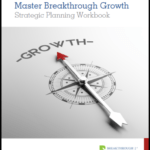For most business leaders, strategic planning is not their favorite activity. Why not? The biggest reason may be that it hasn’t paid off. And for most companies who complete strategic plans, performance goals are usually not attained.
Don’t confuse the performance with the activity! Strategic plans fail for any number of reasons, most of which can be attributed to challenges in execution. The flaw is not in long-term thinking; it is about the quality of the long-term thinking and the ability to execute the plan.
A recent article in Harvard Business Review underscores the value of long-term thinking.
 They examined 615 companies from 2001-2014 which represented approximately 60-65% of the US Market Cap, and the results were clear. Long-term focused companies showed better financial results than their short-term focused peers. They also delivered above average returns and generated more jobs. Interestingly, only 167 or 27% of the companies studied showed evidence that correlated with long-term thinking.
They examined 615 companies from 2001-2014 which represented approximately 60-65% of the US Market Cap, and the results were clear. Long-term focused companies showed better financial results than their short-term focused peers. They also delivered above average returns and generated more jobs. Interestingly, only 167 or 27% of the companies studied showed evidence that correlated with long-term thinking.
Those long-term oriented companies outperformed the short-term thinkers on company revenue by 47%, earnings by 36% profit by 81% and job creation by 132%. If all companies were on this track, as much as 5 million more jobs and $1 trillion in GDP might be created.
Over the years, I have seen many statistics that underscore the challenge in driving performance long- term. Here are some:
- Only 25% of growth initiatives return value
- Strategic plans realize about 2/3 of projected potential
- Less than 20% of companies are able to achieve and sustain modest growth over time
How can you become one of those companies who see benefit from their planning, and growth from their initiatives?
Growth is hard. If you want to increase the odds of success, undertake long-term thinking and planning. Avoid the tendency to lose focus on strategy when the next big thing presents itself. Don’t get caught up in strategic planning processes that are activities; focus on outcomes.
Successful long-term strategic thinking (and planning) is a way of life. It requires a strong foundation in market knowledge, a focused strategy based on market reality (not wishful thinking), and well defined action steps for which people are held accountable.
 For all of these reasons I refer to the work I do with clients as strategic engineering not strategic planning. Strategic engineering is designed to not only craft creative strategy with lots of growth potential but ensures that the implementation path is well defined and the organization is engaged in high performance activities. It requires strategic thinking, implementation planning and constant tracking with occasional adjustments as new market information comes to light. It is dynamic, and long-term.
For all of these reasons I refer to the work I do with clients as strategic engineering not strategic planning. Strategic engineering is designed to not only craft creative strategy with lots of growth potential but ensures that the implementation path is well defined and the organization is engaged in high performance activities. It requires strategic thinking, implementation planning and constant tracking with occasional adjustments as new market information comes to light. It is dynamic, and long-term.
Is your company long-term focused? If not, would you like to be?

